- Home
- Molly Harper
Peace, Blood, and Understanding Page 5
Peace, Blood, and Understanding Read online
Page 5
“I’ve looked up his history. He replaces ninety-four percent of the representatives he audits,” Jane said. “Ninety-four percent.”
“I happen to think you’ll be part of that six percent,” I told her.
“Your optimism is both precious and sort of annoying. Honestly, I know the Council has wanted to get rid of me for a while. I don’t run things the way they want me to. My programmers have embarrassed other districts by completing massive amounts of work on the genealogical search engine ahead of time and on budget. And I have Ben and Meagan in my pocket, and the Council would like nothing better than to have them under the national office’s control.”
“One day you’re going to have to tell me what it is they do for the Council.”
“It’s for your own good if you don’t know,” she assured me.
“I would just like to lodge my official objection to the ‘for your own good’ argument.”
“Noted,” she said, sipping her tea.
“So what does Dick think of Weston’s presence here?”
“Dick had to go home early because he was contemplating how to hide Weston’s ashes in an oil drum and sink it in the Ohio River. And he was thinking so loudly I could hear him from the next room.”
“Dick’s self-restraint does get tested when outside forces stress out the people he cares about,” I said, pouring some heated blood for my own cup of tea.
“It’s one of the things I love best about him,” Jane said. “But it was really hard to maintain my composure and answer questions while Dick was thinking, Murdermurdermurder. Because normally, there’s at least one mention of the Dukes of Hazzard or naked Andrea in his thought loops. The lack of both was highly disturbing.”
I giggled as Jane pulled a pink greeting-card-sized envelope from her back pocket. “Speaking of self-restraint, this came for you through the Louisville office. Please remember that because this landed on my desk, specifically, I am honor-bound by Council statutes and federal postal guidelines to make sure it’s delivered to you. I can’t do anything about what you do with it afterward.”
I hissed as I recognized the neat handwriting on the envelope, gritting my teeth so tightly I worried my canines would snap right off—which would be a problem because they were the one thing we had a really hard time growing back. I wanted to crumple the expensive linen paper into a ball and light it on fire. I wanted to watch as it disappeared into blackened ash. But that was just stupid, pointless lashing out. It wouldn’t change anything and would put the acres and acres of paper around me in serious peril. So instead, I just let the card slip from my fingers into the garbage can.
“Don’t worry, Jane. I won’t stake the messenger.”
Her lips jerked upward, but there was no real mirth in her expression. “How long has it been?”
I muttered into my tea mug. “That makes fourteen trashed birthday cards, I think. You would assume it would be a pretty big hint that they have to send them to the general Council office because I’ve very deliberately never given them my address.”
“Some people see hope where they want to see it.” Jane’s face went all soft and concerned.
“I’m fine, Jane. Really. I should have known it was coming. I just lost track of the calendar is all, what with my job here and the shop. I’m blessed with work, as my foster sire used to say. My life is very full—full enough that I don’t need to open that card.”
“Hey, I’m the last one to judge. I’ve told you about the Great Potpie Capers after I turned,” Jane said, holding up her free hand. “You handle that however you think is best. But if you need someone to talk to or someone to try to reach out in a way you would find comfortable—”
“I’ll come to you,” I promised.
“I was going to say I’ll talk to Dick, because he’s better with that kind of thing,” she said, shrugging.
“That’s not funny.”
“It’s a little funny.”
The elevator dinged and Chloe Darley walked out. Chloe was a curvy brunette with cute black-framed glasses and a penchant for T-shirts with cosmic sloths on them. She was the operations manager and ran the whole complex with her tablet. She had arguably the most boring job in the whole building: making sure that the maintenance teams cleaned everything, that the utility bills got paid, that the secured levels stayed secure. But she had been working in the building since it was constructed, had a darn near encyclopedic knowledge of every floor, every system, and approached her nights with a cheerful devotion I found inspiring.
At the moment, Chloe smelled of jangled nerves, the bright ozone scent that only seemed to cling to her when her routine was disrupted. I had a feeling I knew where that disruption was coming from.
“Hi, Meadow!” she chirped.
“Hey there, Chloe. How’s the building?”
“Oh, practically runs itself. Is it comfortable for you down here, thermostat-wise?”
“Sure, nice and cool. Not too humid for the documents.”
Chloe grinned. “Glad to hear it.”
“What brings you down here?” Jane asked.
“Your assistant told me you were down here,” she said. “That guy Weston has asked for the last five years’ worth of records from my office. He wants to know who vetted our cleaning crew. He wants to know how often we adjust the thermostat. He wants to know how many paper towels we’re ordering for the bathrooms. And before I give him anything, I just want to make sure it’s OK with you.”
Yep, that would explain the ozone-nerves smell.
“It’s fine, Chloe—thanks for checking. But he gets to look at whatever he wants.”
“Well, you might want to send some sort of memo out to the department heads, because they’re on the verge of revolt. They don’t appreciate the questions he’s asking or how he’s asking them,” Chloe said, pursing her lips. “I don’t want to be mean, but he’s a very abrasive person.”
“Great,” Jane groaned. “Thanks for telling me. I’ll go calm down the troops.”
“Thanks.” Chloe sighed.
“Any chance of you making enough of this Bliss tea for everybody who works here?” Jane asked.
“I don’t think that would make for a very productive workday, corporately speaking.”
“Any chance of me getting this tea to go?” Jane asked.
“Just take the mug.”
“You’re a gem,” she told me, following Chloe into the elevator.
“Remember that when my evaluation comes up!” I called after her.
* * *
I walked to and from work most nights, just to enjoy the evening air. There was a sort of sweet spot in Kentucky weather, right before spring aged into summer, when one got all of the pleasant warmth the South could offer without the stifling humidity. The dogwoods and tulip trees would burst like pink-and-white fireworks, and the civic committee would arrange for special lighting for nighttime “flower tours.” It was one of the few reminders of home I could stand without ending up meditating on my anger.
I breathed in deeply, even though I didn’t need the oxygen, just so I could enjoy the scent of flowers and fresh-cut grass. I loved my friends at work. I loved Jane and her little family. But I needed moments like this alone, which was part of why I loved my job in the archive so much. The house I’d grown up in was quiet, but it was a cold, resentful lack of conversation, as opposed to peace.
I passed by the town bandshell, just a few blocks up from my apartment. It was sort of the centerpiece of the revived downtown, refurbished but rarely used. Around that center had sprung up nicer local restaurants like Chandler’s and Southern Comforts, and upscale boutiques that sold useless pretties. But a glaring gap in that carefully cultivated smile was the overgrown lot between Chandler’s and a gift boutique called Riverside Treasures. At one point, an old movie house called the Capitol Theater stood there, but it had fallen into disrepair after chain cinemas moved into town, and then a fire in the 1990s took out the building’s shell. Now it was just a coupl
e of broken brick walls and weeds too numerous to name.
No one seemed to know who owned the lot, as the ownership of the Capitol was in probate court when it burned, and then those contestants died. And the county didn’t seem to know what to do with it, either. So it just sat there, unattended and unused. I wandered to the edge of the lot, staring into the broken ground. At some point, after the fire, someone had filled in the cellar—most likely to keep out the teenagers who had burned it down in the first place—with dirt. It was good soil, though—the kind we used to have in the pastures: dark and rich and frequently fertilized by the horses.
It was a shame that the town couldn’t figure out a use for it. Maybe I could ask Jane about the lot. The local Council office could make it into some sort of public art project or maybe even install some sort of weather-protected photo timeline detailing the town’s history. I’d seen that sort of thing in Paducah and Marion. Then again, Jane had enough to worry about with the audit and Weston and everything. I probably didn’t need to bring that up with her right now.
I would love to do it on my own, but it would take someone with a lot more resources, time, and logistical sense than I had to do that—the irony being that if I opened any of those trashed birthday cards and reestablished contact with my family, I could get my hands on enough cash to turn this lot into a full museum with animatronic former mayors of Half-Moon Hollow to host tours. But I wouldn’t touch that dirty money or the people who handled it.
I could feel the anger boiling up from my gut like acid. No. I would not succumb to my old habits twice in one night, which would be a serious setback for me. Thinking about my parents had this effect on me, from the moment I was turned. I wouldn’t let them drag me down again. I would work ahead of it. I closed my eyes and pictured my safe place. The barn, in the loft, surrounded by sweet-smelling hay while I watch the clouds drift by through the gaps in the roof. I let the sense memory wash over me, bringing me back to a time when I was centered and calm, before the world came crashing in on my idyllic little life. I let that stillness take me in and made a conscious effort to release the hurt that had been festering since Jane handed me that stupid card.
It was fascinating how my parents affected my emotional well-being, considering how little they cared for actual emotions. They hadn’t asked a lot of me, growing up. I smiled pretty for photos and got good grades. And they gave me the money for school, a car, everything I needed to appear to be a good girl from an affluent family. But that also involved not expressing emotion. No one in my family expressed anything beyond How was your day, dear? Good, I’ll be in my study. That was the sum total of our conversation every night at dinner. Nothing positive, nothing negative. I never even noticed that it was a problem, until their dirty business dealings got me turned into a vampire, and then they treated me like I was some sort of untouchable, a disgrace. And I went on a multiyear rampage that resulted in the deaths of dozens of people, both human and vampire.
But then I’d been assigned to Leona, the person I considered my real mother, and she’d taught me to use my gift to help people, to find what was bothering them and make it better. She gave me a way to take back the pieces of myself from the awful pit I’d dug. I missed her. I missed her folksy wisdom and the advice that always seemed to be hidden in a story from her younger days as a vampire. And I missed the way she managed to make a vampire version of hot cocoa out of Hershey’s Blood Additive and type O.
And as usual, thinking about Leona brought me back to that place of calm.
I opened my eyes and didn’t feel like setting anything on fire, which I considered more than enough progress for one night.
4
Find your passion in your unlife. Having an activity that you love will keep you from the more destructive vampire occupations—maiming, killing, bowling.
—Peace, Blood, and Understanding: A Living Guide for Vampires Embracing Pacifism
My shop wasn’t quite as comfortable or polished as Jane’s. I didn’t have the comfy chairs or the gleaming maple shelves or the pretty little knickknacks arranged just so. I did have whitewashed walls, about two dozen IKEA bookshelves that I’d distressed to look like they’d been there for damn near a century, and a shit-ton of glass apothecary jars I’d bought in bulk from a wedding supplier. If I ever needed to throw rustic-chic barn nuptials, I was fully prepared.
The jars near the register—an old dresser I’d upcycled from a yard sale—were filled with finished blended teas. The rest of the shelves held dried herbs and fungi, which made the space smell like some mythical garden. The closest I got to décor was the jars full of quartz crystals and semiprecious stones I kept around because, well, people sort of expected that in an herbalist store. And the colors looked really pretty all stacked up behind the glass like that. I hadn’t planned on playing music in the shop, but then Dick gave me a CD of pan flute music over nature sounds called “Peruvians Trip the Light Fandango” with such an earnest expression on his face that I couldn’t say no. I was currently listening to “Whale Sounds at Machu Picchu” while packing online orders, which was oddly soothing.
The less mystical-looking elements of my shop, such as the refrigeration units that held the donor blood I used in my teas, were kept in the storage room in the back. There’s nothing dreamy or transcendent about a used Frigidaire. That’s also where I kept the wealth of licenses required when you planned on stocking human blood and serving it to people.
Herbalism for the undead was a relatively new field, since vampires as a group didn’t stray from their blood-based diet. Sure, they might mix a little vampire-friendly chocolate or coffee flavoring additive into their blood for variety, but that was pretty much it. I drank ethically sourced donor blood because I thought it was a more responsible food choice, even if it was far from the diet that nature, or supernature, intended for us. Donor and bottled blood development were relatively new, and those who chose to live on animal blood were treated like human vegans, ironically enough.
I wished I’d had some warning that I was going to be forcibly turned, so I could have chosen a last meal. Fried chicken with a baked potato swimming in butter, and a pecan pie, like our housekeeper, Anna, made—I would have enjoyed every bite and willingly shuffled onto nonmortal coil. But, tragically, vampires didn’t have the enzymes to process solids. Human food smelled spoiled and wrong to us, and tasted worse. Vampires who tried to prove to themselves or others that they were still human by eating regretted all of their life decisions.
We still had functioning systems, though—nervous, adrenal, and so forth. Otherwise, we wouldn’t have superstrength or speed or agility. And, just as Dr. Iris Scanlon wrote in her groundbreaking book, Bitten Botanicals, while herbs didn’t have the same effect on us that they had on humans, they still affected us. The reactions weren’t one-to-one comparisons, which wasn’t surprising given the differences in our physiology. Saint John’s wort, for instance, was basically cocaine to vampires. No one was sure why, but give a vampire a cup of Saint John’s wort tea, and everything in Scarface seemed hilarious and yet very, very accurate. On the other hand, some herbs only affected vampires while having little to no effect on humans. Bloodwort, fangbalm, merrypip, Wendell flower—while all were highly effective in treating (or subduing) vampires, humans would feel nothing after consuming them. A human could eat ten pounds of an Appalachian mountain plant called rushmallow, but if a vampire consumed a single drop of that plant’s extract they’d vomit like something out of The Exorcist.
Over the last ten years I’d developed about thirty tea blends to address vampire issues such as staying awake during the night and staving off bloodthirst. I hadn’t found a tea that would make us sunproof, though. As amazing as that might be, the testing was just too dangerous.
I carefully taped the label for a boxful of Sunset Fuel tea, a blend meant to energize vampires who struggled with waking up at night. It was a mix of Wendell flowers, green tea, and a smidge of Saint John’s wort so faint it would have ab
out the same effect as a double espresso. It was a customer favorite and one of my biggest sellers. I’d taken to making octuple batches just to keep it stocked.
I was pleased to make a little fort of these shipping boxes on my counter. While my online orders were enough to keep the doors open and the lights on, I hoped that Jane’s Tuesday Night Tea Tastings would eventually draw more in-store traffic. So naturally, I rushed to the sales floor from the storage room—where I’d ventured for more tape—when I heard the little bell over my door ring.
“Good evening! Welcome to Everlasting Health, where your health is our happiness…” I skidded to a halt as a familiar mouthwatering aroma filtered over even the olfactory cornucopia that was my store. I realized my “customer” was Erik Weston. “Oh, for crap’s sakes. What are you doing here?”
Weston’s confused expression morphed into one of near-loathing. “Is that how you normally greet customers?”
“Are you honestly going to tell me that you’re a customer?” I deadpanned. “You’re here to buy tea? Not just to make me reconsider a commitment to nonviolence?”
He glanced around the shop with disdain, which only increased as the whale sounds played over windchimes on the speaker system. “No. I’m looking for the office supply store listed at this address. Staplerama? I need file folders and binder clips.”
“Well, of course you do. And that store hasn’t been here for years,” I said. “It went the way of mimeograph machines and carbon paper. Did you look it up in a paper phone book or something?”
He frowned. “No. But I think even Google is subject to this town’s backwardness.”
Despite the mesmerizing scent rolling off of him in waves, I couldn’t place what was going on with Weston. He was clearly in need of something. He didn’t strike me as a particularly happy person. But he didn’t suffer any physical ailments, and any emotional wounds he was suffering, he kept hidden deep under that expensively tailored shirt.

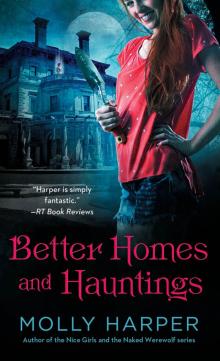 Better Homes and Hauntings
Better Homes and Hauntings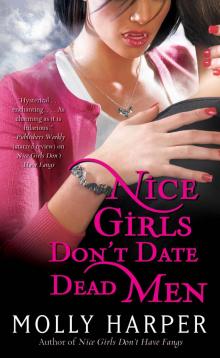 Nice Girls Dont Date Dead Men
Nice Girls Dont Date Dead Men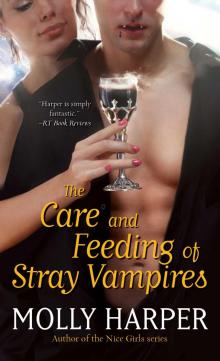 The Care and Feeding of Stray Vampires
The Care and Feeding of Stray Vampires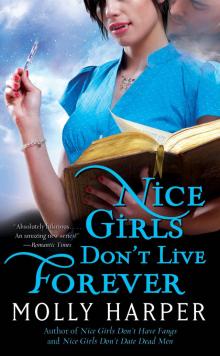 Nice Girls Dont Live Forever
Nice Girls Dont Live Forever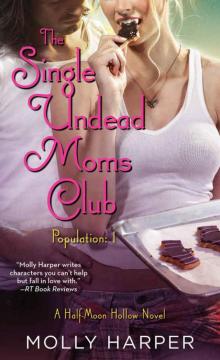 The Single Undead Moms Club
The Single Undead Moms Club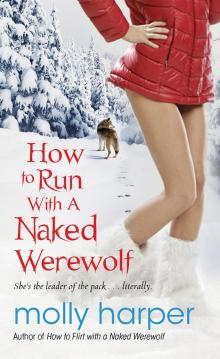 How to Run with a Naked Werewolf
How to Run with a Naked Werewolf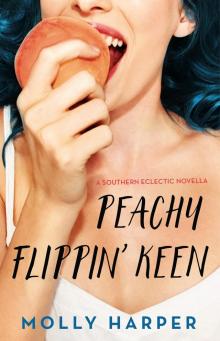 Peachy Flippin' Keen
Peachy Flippin' Keen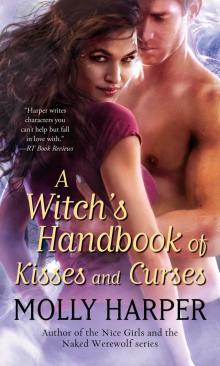 A Witchs Handbook of Kisses and Curses
A Witchs Handbook of Kisses and Curses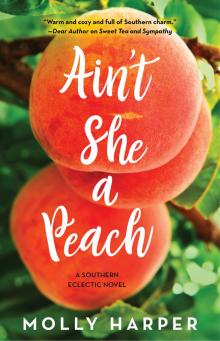 Ain't She a Peach?
Ain't She a Peach?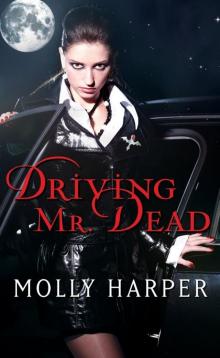 Driving Mr. Dead
Driving Mr. Dead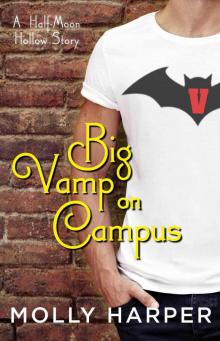 Big Vamp on Campus
Big Vamp on Campus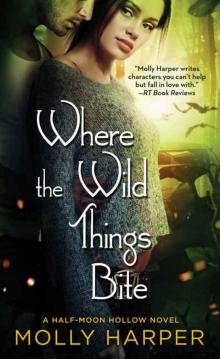 Where the Wild Things Bite
Where the Wild Things Bite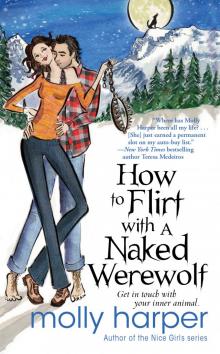 How to Flirt with a Naked Werewolf
How to Flirt with a Naked Werewolf Nice Girls Don’t Sign a Lease Without a Wedding Ring
Nice Girls Don’t Sign a Lease Without a Wedding Ring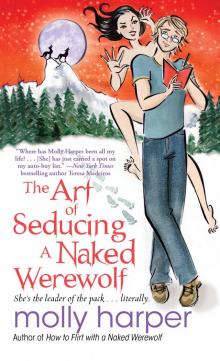 The Art of Seducing a Naked Werewolf
The Art of Seducing a Naked Werewolf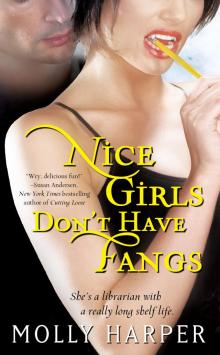 Nice Girls Dont Have Fangs
Nice Girls Dont Have Fangs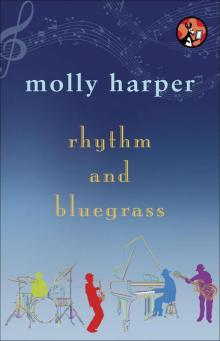 Rhythm and Bluegrass
Rhythm and Bluegrass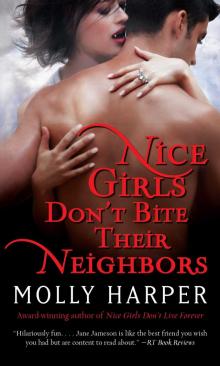 Nice Girls Dont Bite Their Neighbors
Nice Girls Dont Bite Their Neighbors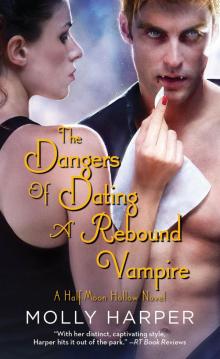 The Dangers of Dating a Rebound Vampire
The Dangers of Dating a Rebound Vampire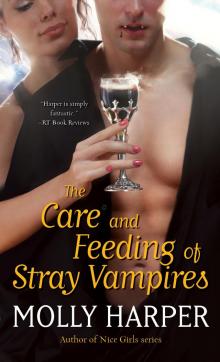 Undead Sublet
Undead Sublet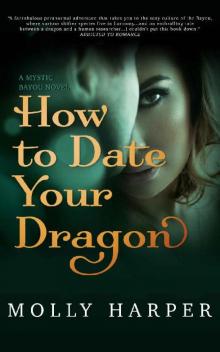 How to Date Your Dragon
How to Date Your Dragon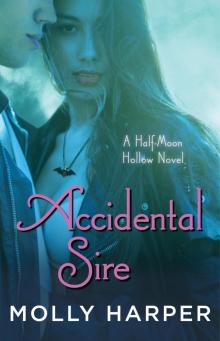 Accidental Sire
Accidental Sire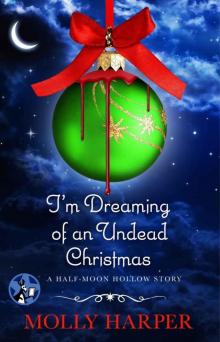 I'm Dreaming of an Undead Christmas
I'm Dreaming of an Undead Christmas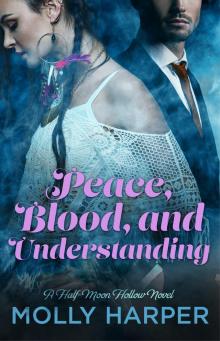 Peace, Blood, and Understanding
Peace, Blood, and Understanding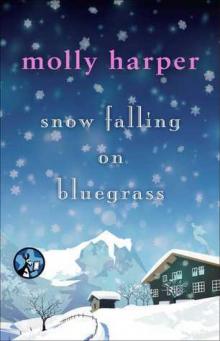 Snow Falling on Bluegrass
Snow Falling on Bluegrass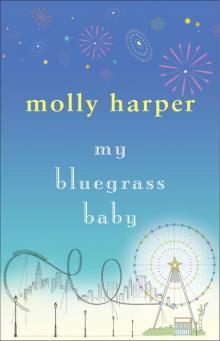 My Bluegrass Baby
My Bluegrass Baby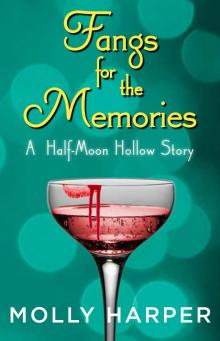 Fangs for the Memories
Fangs for the Memories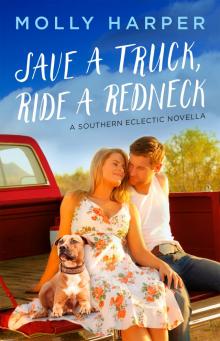 Save a Truck, Ride a Redneck
Save a Truck, Ride a Redneck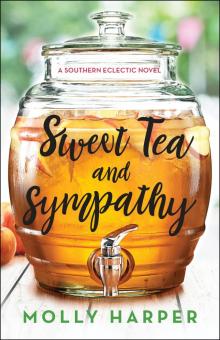 Sweet Tea and Sympathy
Sweet Tea and Sympathy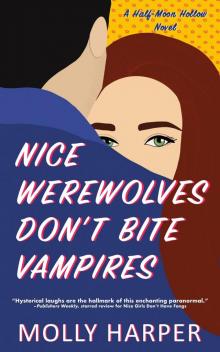 Nice Werewolves Don't Bite Vampires
Nice Werewolves Don't Bite Vampires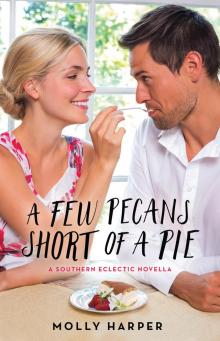 A Few Pecans Short of a Pie
A Few Pecans Short of a Pie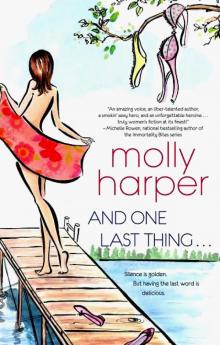 And One Last Thing ...
And One Last Thing ...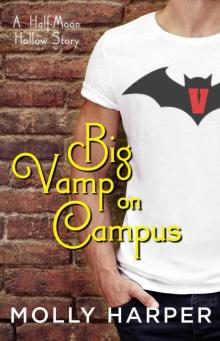 Big Vamp on Campus (Half-Moon Hollow Series Book 7)
Big Vamp on Campus (Half-Moon Hollow Series Book 7)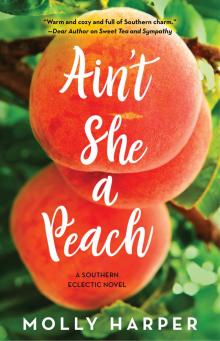 Ain't She a Peach
Ain't She a Peach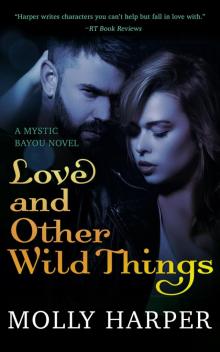 Love and Other Wild Things
Love and Other Wild Things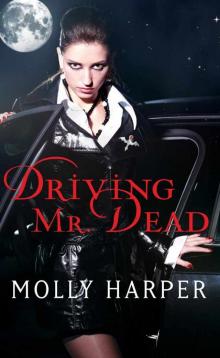 Driving Mr. Dead
Driving Mr. Dead![[Jane Jameson 03.5] Nice Girls Don't Sign A Lease Without A Wedding Ring Read online](http://i1.bookreadfree.com/i1/04/06/jane_jameson_03_5_nice_girls_dont_sign_a_lease_without_a_wedding_ring_preview.jpg) [Jane Jameson 03.5] Nice Girls Don't Sign A Lease Without A Wedding Ring
[Jane Jameson 03.5] Nice Girls Don't Sign A Lease Without A Wedding Ring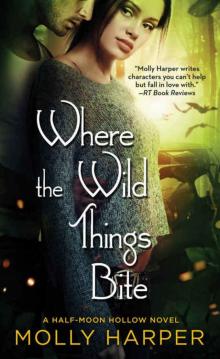 Where the Wild Things Bite (Half-Moon Hollow #8)
Where the Wild Things Bite (Half-Moon Hollow #8)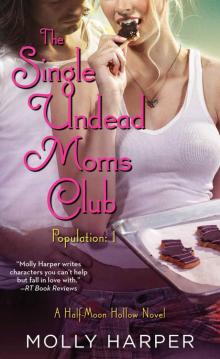 The Single Undead Moms Club (Half Moon Hollow series Book 4)
The Single Undead Moms Club (Half Moon Hollow series Book 4)